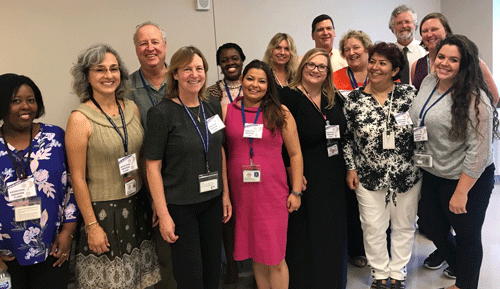Helping you on the path to full recovery from substance use disorder
 Medications can help ease the discomfort you may experience when withdrawing from opioids or other substances and reduce cravings for further use. Medication-Assisted Treatment (MAT) through the CSB's Addiction Medicine Clinic (AMC) is provided to adults in an outpatient setting. Using AMC’s services allows you to remain in the community throughout detoxification and substance use disorder treatment, if appropriate. Counseling services and referrals for additional treatment are also provided to help you begin and sustain your recovery. Studies show the use of Medication Assisted Treatment for opioid use disorders has led to successful recovery rates of 40-60%, compared to 5-20% for abstinence-only models (DMAS, 2017).
Medications can help ease the discomfort you may experience when withdrawing from opioids or other substances and reduce cravings for further use. Medication-Assisted Treatment (MAT) through the CSB's Addiction Medicine Clinic (AMC) is provided to adults in an outpatient setting. Using AMC’s services allows you to remain in the community throughout detoxification and substance use disorder treatment, if appropriate. Counseling services and referrals for additional treatment are also provided to help you begin and sustain your recovery. Studies show the use of Medication Assisted Treatment for opioid use disorders has led to successful recovery rates of 40-60%, compared to 5-20% for abstinence-only models (DMAS, 2017).
What is the Addiction Medicine Clinic?
The Addiction Medicine Clinic is the CSB’s only outpatient provider of buprenorphine. AMC provides substance use disorder services through Office-Based Opioid Treatment (OBOT). AMC also supports clients who are adding buprenorphine to their services while in another CSB substance use disorder treatment program. AMC is based at the Sharon Bulova Center, with weekly satellite clinics at the Gartlan Center and the Northwest Center.
What is Medication-Assisted Treatment?
Medication-Assisted Treatment is the use of Food & Drug Administration-approved medications such as buprenorphine, naltrexone, Antabuse and Vivitrol in combination with counseling and behavioral therapies to treat substance use disorders and prevent opioid overdose. These prescribed medications help to normalize brain chemistry, to reduce the feelings of euphoria when using drugs, relieve physiological cravings, and stabilize your body without the negative effects of the abused drug.
MAT is medically based and treats addiction as a disease process. The primary medication used in MAT at the CSB for the treatment of opioid dependence is buprenorphine. Specialized training is required before a physician, nurse practitioner, or physician assistant can prescribe this medication.
Maintenance treatment like MAT helps to stabilize you in your recovery, allowing you to receive treatment for related medical, psychological and other issues so you can improve your quality of life.
What is Office-Based Opioid Treatment (OBOT)?
Office-Based Opioid Treatment (OBOT) is specifically designed for those with past or present opioid use disorders. OBOT includes medication management, case management, supports from a Peer Recovery Specialist, and optional therapy (group and individual). Clients can receive treatment for their co-occurring psychiatric diagnosis through OBOT.
Flexibility is a hallmark of AMC’s OBOT program, as clients may choose from a range of treatment activities that best suit their needs and preferences. While groups are offered and strongly encouraged in OBOT, they are not the only way to complete the program, making it a good option for those who struggle with group treatment.
OBOT consists of three phases:
- Phase One and Phase Two require clients to complete a specific number of treatment activities over a period of at least three months per phase, in order to move forward. Phase One is typically weekly treatment and Phase Two is typically biweekly treatment. After Phase Two clients are eligible for a Completion Certificate.
- Phase Three is a maintenance phase, appropriate for clients who are well-established in their recovery and able to sustain it with treatment on a biweekly or monthly basis.
OBOT is an abstinence-encouraging program, helping people at all stages of their recovery. Responses to a slip or relapse are based on individual circumstances, and may include more frequent outpatient services, participation in residential detox to re-stabilize, or referral to a higher level of care. Decisions about dispensing medication are based on a client’s health and safety. All OBOT phases use observed urine analysis prior at each prescriber visit.
Who can receive AMC services?
To be eligible for services, you must:
- Be a resident of Fairfax County or the cities of Fairfax and Falls Church.
- Be age 18 or older.
- Be able to access outpatient services (you must be able to get to the Sharon Bulova Center for your appointments).
- Be medically and psychiatrically stable enough for MAT.
- Have a recent assessment for AMC services.
Who provides client care for Medication-Assisted Treatment?
The professional staff providing Medication-Assisted Treatment at the Addiction Medicine Clinic include:
- Medical prescribers (medical doctor, psychiatrist, physician assistant, nurse practitioner)
- Nursing staff
- Behavioral health staff (including Licensed Clinical Social Workers, Licensed Professional Counselors, and Certified Substance Abuse Counselors)
- A pharmacy representative
Can I afford treatment at AMC?
AMC accepts Medicaid and other types of insurance, offers a sliding scale for people without insurance, and has assistance for medication costs for those who can’t otherwise afford their medication.
How can I access AMC services?
New CSB clients can contact CSB Entry & Referral Services at 703-383-8500 to request an assessment for the Addiction Medicine Clinic and Office-Based Opioid Treatment. Walk-in assessments are available Monday through Thursday from 8:00 a.m. to 3:00 p.m. and Friday from 10:00 a.m. to 3:00 p.m., at the Sharon Bulova Center on the Lower Level.
Current CSB Fairfax Detoxification Center clients can ask for a “step-down” appointment to go directly to AMC after completing detox. AMC staff are at Detox twice per week to schedule these appointments.
Current CSB clients can ask the staff they already receive services from to submit a referral to the Addiction Medicine Clinic. Medication Assisted Treatment may be added as a secondary service to another CSB program, or a client may transfer into Office-Based Opioid Treatment.

